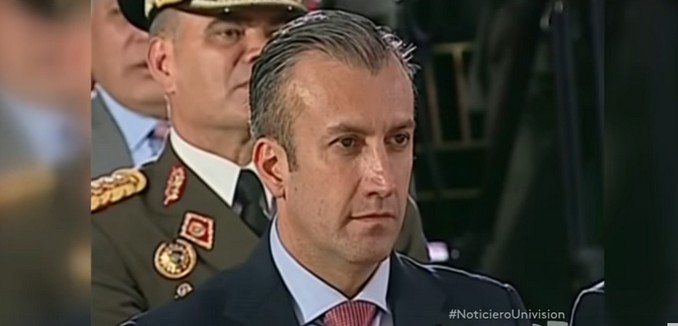The newly appointed vice president of Venezuela is suspected by American intelligence of drug smuggling as well as close ties to Iran, Syria, and Hezbollah, Business Insider reported Thursday.
The appointment of Tareck El Aissami, formerly the governor of Aragua state, means that if he could become the country’s president if the increasingly-embattled Nicholas Maduro is recalled or steps down.
While serving as interior minister under Maduro’s predecessor Hugo Chavez, El Aissami reportedly participated in a program to provide Syrian terrorists with Venezuelan passports. Joseph Humire, the founder of the Center for a Secure Free Society think tank, testified before the House Foreign Affairs Committee in 2015 that El Aissami “developed a sophisticated, multi-layered financial network that functions as a criminal-terrorist pipeline bringing militant Islamists into Venezuela and surrounding countries, and sending illicit funds and drugs from Latin America to the Middle East.”
His financial network consists of close to 40 front companies that own over 20 properties with cash, vehicles, real estate and other assets sitting in 36 bank accounts spread throughout Venezuela, Panama, Curacao, St. Lucia, Southern Florida and Lebanon. This network became integrated with the larger Ayman Joumaa moneylaundering network that used the Lebanese Canadian Bank to launder hundreds of million of dollars and move multi-ton shipments of cocaine on behalf of Colombian and Mexican drug cartels as well as Hezbollah.
The Wall Street Journal reported in 2014 that while El Aissami was its governor, Aragua was home to the explosives company Parchin Chemical Industries and the drone-makers Qods Aviation, two companies owned by Iran’s military and sanctioned by the United Nations Security Council for their involvement in the Islamic Republic’s nuclear and ballistic missile programs.
After Iranian Foreign Minister Mohammad Javad Zarif visited Venezuela last August, Emanuele Ottolenghi, a senior fellow at the Foundation for Defense of Democracies, speculated that one of the reasons for the trip was to shore up Iran’s ballistic missile program. Ottolenghi cited a recently-discovered contract between the two countries to jointly produce solid rocket fuel.
Tower senior editor Ben Cohen observed at the time that alliances with Iran are often costly for the people of the nations that have them:
Iran will continue to back Latin American governments out of favor with their own citizens. Zarif’s presence in Venezuela, at a time when the majority of the country’s voters are demanding a referendum on the future of its current leader, Nicolas Maduro, is a clear signal that Iran is intent on maintaining a mini-empire of its own, despite Tehran’s protestations about American meddling. Maduro’s policies, based on those of his predecessor, Hugo Chavez, have brought Venezuela to its knees. Hunger is rampant, crime has reached record levels and hospitals have run out of basic medicines.
Indeed, one look at the sorry state of Venezuela – once the richest Latin American country, with huge oil reserves – should be enough to persuade the most skeptical observer that an alliance with Iran is part of a package that also includes economic ruin and political repression. But until we take the necessary steps in Latin America, and in other regions vulnerable to Iranian influence, the mullahs have no incentive to pull back.
[Photo: Univision Noticias / YouTube ]




